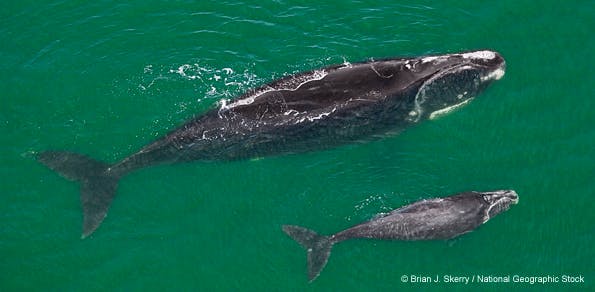
Originally published at TalkingFish.org
A pending decision on fishing for cod and other groundfish in New England has big implications for marine mammals including some of the most endangered animals in our waters, the North Atlantic right whale.
The National Oceanic and Atmospheric Administration (NOAA) is weighing a proposal that would expand commercial fishing into some 5,000 sq. miles of protected waters inside what are known as “groundfish closed areas” along the New England coast. More than 100 scientists sent a letter warning NOAA that this is a bad move for fish. But that’s not all. Scientists and conservationists also raised red flags about the potential harm to right whales, humpback whales, and harbor porpoises if NOAA ends protection for the closed areas.

Right whale sightings are concentrated within many of the current closed areas. Opening them to commercial fishing could put whales at risk. (©TalkingFish.org)
Right whale sightings are concentrated within many of the current closed areas. Opening them to commercial fishing could put whales at risk. As this map shows, hundreds of right whale sightings have been documented in the closed areas.
“Opening these currently closed areas to fishing only increases the overall risk of entanglement for whales,” said Sierra Weaver, an attorney formerly with the conservation group Defenders of Wildlife.
Defenders joined the New England Aquarium, the Humane Society of the U.S. and other groups in a letter to NOAA. The letter explains that fishing vessels are already accidentally killing too many of the area’s two most endangered species of large whale, the right and humpback whales. And allowing commercial fishing in areas that have been safe harbor for these animals will only make matters worse.
“With only about 400 North Atlantic right whales left, every loss is a blow to this critically endangered population,” Weaver added.
The groundfish closed areas have been an important part of plans required by the federal arine Mammal Protection Act to minimize whale deaths due to fishing. The groups make clear in their letter that allowing commercial fishing in an area the size of Connecticut would change all the underlying assumptions in the plan regarding risk and rates of whale mortality. There is little indication that NOAA or the New England Fishery Management Council has sufficiently considered this.

A right whale calf swims under the chin of its mother. Researchers sighted the pair 13 miles off Amelia Island, FL on December 28, 2012.
Others wrote to remind officials about how important whales are to the coastal economy. Maine naturalist Zack Klyver said the company he works for, Bar Harbor Whale Watch Co., takes 50-60,000 passengers to see whales each year.
“These visitors have an exponential effect on the New England economy as they stay in our hotels, eat at our restaurants, and pay for gas,” Klyver wrote in his letter. Maine’s tourism industry generated nearly $10 billion last year—more than the state’s fisheries, forestry and agriculture combined, Klyver wrote. And he included this tidbit: the Maine office of Tourism found that “whales” is among the top words people use to search the office’s website.
Many of the letters and comments to NOAA noted how little thought seems to have been given to the broad ranging effects of the decision on the closed areas, and how rushed the decision process seemed. One letter cited the old adage “haste makes waste.” In this case, a hasty decision could end up wasting the lives of animals we cannot afford to lose.




